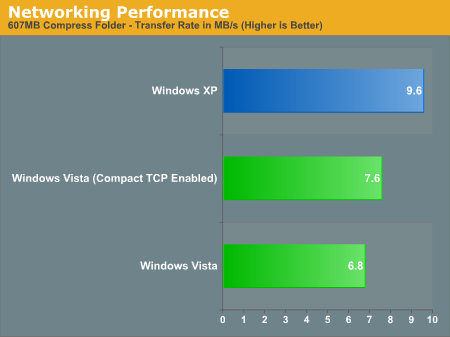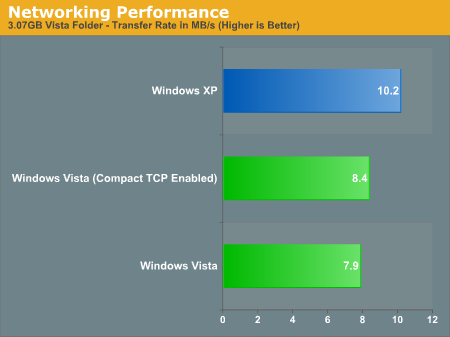Networking Benchmarks
Just to get a quick idea of what these new features can do, we ran our usual networking benchmark suite on a pair of ASUS P5B-Deluxe motherboards using both the on-board PCI and PCIe connected gigabit network controllers (Marvell 88E8056 and 88E8001 respectively). We used two tests for this, a multiple small file transfer test consisting of about 450 files totaling 600MB, and a large file transfer test consisting of a pair of ISO images totaling 3GB. In order to keep the load on our D-Link Gamer Lounge router consistent, we also had the WMV-HD version of Terminator 3 streaming in the background. We tested Windows XP SP2 for a base score, followed by Vista with Compound TCP switched on and off.


Unfortunately for Vista, neither test is particularly favorable. Compared to XP when Compound TCP is disabled, Vista is anywhere between 25% and 50% slower than XP in terms of the total time required for these tests. Without the ability to separate Vista's networking stack from the drivers for our NICs, it's impossible to tell if this slowdown is the fault of the networking stack being worse for this situation, or if the Vista drivers for this line of Marvell NICs are not quite as tuned, so as a comparison to XP this test is inconclusive. Either way, for this particular setup Vista ends up being slower at file transfers than XP.
The one bright spot however is that when enabled, Compound TCP is clearly having some effect even on our low-latency network. The 5% or so boost in Vista's low scores won't bring it back above XP, but it clearly proves that Compound TCP does have a real-world effect on performance. This will be something we will be able to talk more about as Microsoft perfects this algorithm set for the release of Longhorn Server later this year. Hopefully, the relatively slow performance we're seeing right now is being caused by drivers rather than by Vista's "new and improved" networking stack. We will definitely keep an eye on networking performance over the coming months, as most of the people we've talked with expected Vista's networking performance to be faster than XP's.
Just to get a quick idea of what these new features can do, we ran our usual networking benchmark suite on a pair of ASUS P5B-Deluxe motherboards using both the on-board PCI and PCIe connected gigabit network controllers (Marvell 88E8056 and 88E8001 respectively). We used two tests for this, a multiple small file transfer test consisting of about 450 files totaling 600MB, and a large file transfer test consisting of a pair of ISO images totaling 3GB. In order to keep the load on our D-Link Gamer Lounge router consistent, we also had the WMV-HD version of Terminator 3 streaming in the background. We tested Windows XP SP2 for a base score, followed by Vista with Compound TCP switched on and off.


Unfortunately for Vista, neither test is particularly favorable. Compared to XP when Compound TCP is disabled, Vista is anywhere between 25% and 50% slower than XP in terms of the total time required for these tests. Without the ability to separate Vista's networking stack from the drivers for our NICs, it's impossible to tell if this slowdown is the fault of the networking stack being worse for this situation, or if the Vista drivers for this line of Marvell NICs are not quite as tuned, so as a comparison to XP this test is inconclusive. Either way, for this particular setup Vista ends up being slower at file transfers than XP.
The one bright spot however is that when enabled, Compound TCP is clearly having some effect even on our low-latency network. The 5% or so boost in Vista's low scores won't bring it back above XP, but it clearly proves that Compound TCP does have a real-world effect on performance. This will be something we will be able to talk more about as Microsoft perfects this algorithm set for the release of Longhorn Server later this year. Hopefully, the relatively slow performance we're seeing right now is being caused by drivers rather than by Vista's "new and improved" networking stack. We will definitely keep an eye on networking performance over the coming months, as most of the people we've talked with expected Vista's networking performance to be faster than XP's.










105 Comments
View All Comments
redpriest_ - Thursday, February 1, 2007 - link
Did you guys run the 64-bit tests solely on the Intel Conroe platform? Or did you test an AMD based platform as well? Recall that Conroe has a few performance enhancing features that *only* work in 32-bit mode (branch fusioning, for one - some decoder limitations as well).That could explain why a Core 2 Duo system might have seemed slower in 64-bit than in 32-bit mode.
Jeff7181 - Thursday, February 1, 2007 - link
SuperFetch is by far my favorite new feature of Vista. I put my first copy of Vista on my laptop, which has a 5400 RPM hard drive. Opening apps Outlook and VB .NET 2005 EE weren't really slow under XP, but there were those few extra seconds it took to load that would often leave me tapping my finger on the palm rest while I waited. Now under Vista, Outlook, VB .NET 2005 EE, and IE7 all seem to be able to fit in the SuperFetch cache, as they all open nearly instantly with just 1 GB of RAM. I'm considering upgrading to 2 GB just to see what else I can get to open really fast. :Dbldckstark - Thursday, February 1, 2007 - link
Was superfetch disabled when you tried the Readyboost feature in Vista? Whichever way you ran the test it bears mentioning. If it was off, then how does it do with it on? If it was on, it may make a difference in how it relates to XP.Also, as I understand it Vista has a system backup now that creates a "ghost" of the drive. Could you check out this feature and get back to us?
JarredWalton - Thursday, February 1, 2007 - link
I'm not sure it's possible to disable SuperFetch, so I'm pretty sure all testing was done with it on. As far as the "ghost" goes, that's part of System Restore which can be disabled quite easily. I'll have to let the other editors say whether it was enabled or not, though.WT - Thursday, February 1, 2007 - link
What drives me nuts are the plentiful comments about how slow Vista is compared to XP. I mean, anybody hear this before when MS came out with a new OS ? Same thing for XP,W2k,98 ... ad nauseum. Yea, its a new Operating System with more 'toys' built in, what were you expecting ? You aren't gonna load it on your P3/256 RAM rig and enjoy the Vista 'experience'. Damn, this thing runs better than XP on my rig !It's understood that it won't be as quick (keep in mind the OS has been available for retail purchase ... 2 days now) as XP, but drivers will improve that performance gap to a smaller number within 3 months time. I waited until just last year to upgrade to XP (W2K all the way for me !) but find myself with 2 copies of Vista and would prefer to dual boot one and go Vista all-out on the other one.
I griped back in my W2K days about being forced to upgrade due to content (MS games were announced that would only run in XP) so this time around I will be ready.
DX10? Marketing genius !!! We shall force an upgrade upon the masses !! I upgrade frequently, so DX10 and its graphical splendor is a priority, but if I would have to fork over $200 to actually buy Vista, I would be less than impresssed with DX10 eye candy.
EODetroit - Thursday, February 1, 2007 - link
Hopefully, now, finally, Anandtech will start testing motherboards for stability while loaded with the maximum amount of memory. So if the MB supposedly supports 8GB of RAM, you test it with that much, and make sure its stable. I've wanted this done for years... memory is expensive and it sucks to load a MB up and find out it doesn't really work or only works if you cut the speed in half.Thanks.
manno - Thursday, February 1, 2007 - link
... no mention of DRM then? No mention of Linux? Personally I hate Linux, but I've switched to it because of Vista's use of DRM. Not all Microsoft's fault, but they put it in there... My computer, my hardware, I choose what to do with it, not MS, not media companies. Why shouldn't I be able to watch High def content on my old, and once expensive non-HDMI LCD screen?Get a Mac, Apple is the lesser of 2 evils, they aren't the 800lb gorilla in the room. MS could have told media companies to stuff it. Apple has no choice, it's too small, yet their the ones that forced DRM-Light(TM) on the media companies. MS had the media companied force DRM-Oppressive(TM) on them... how the heck does that work?
I can't believe you left Linux out of the final comparison, is it as capable an OS, yes. Not nearly as user friendly, but it also has 0 DRM, doesn't phone-home isn't beholden to any one entity. I'm not against DRM, as a whole, just Vista's implementation. BS like MS creating D3D to subvert open standards like OpenGL, then removing it from the OS, using it's monopoly-based-ridiculous-margins(TM) to finance D3D's uptake, again rather than take an existing standard and expanding on it. They create their own to reinforce their monopoly. I know why they do this stuff I'm just peeved so many people don't give two flying f...
grr...
-manno
mlambert890 - Friday, February 2, 2007 - link
Youre insane dude.. No offense but there just isnt anything else to say. Posts like these always read like the transcript of a Weather Underground meeting in the sixties. "FIGHT THE POWER!!! FIGHT THE POWER!!!"Look out! The black helicopters have deployed from the underground helipad in Redmond and are circling!!! Send up the penguin symbol to summon the dynamic duo - Torvald and Stallman!
Reflex - Thursday, February 1, 2007 - link
There is no more or less DRM in Vista than in XP, or even OS X. The platform does not determine the playback of DRM'd media, the content does. The choice is simple: If you want to play back DRM'd media, then you have to support the decryption scheme that the media requires to decode it. In so doing you have to legally accept the limitations defined by that DRM scheme.It is no different for OS X, Linux, XP or any other OS. They either support the DRM schemes or they do not get to playback the media that uses them. This is why it is unlikely that you will be able to play DRM'd High Definition content anytime soon on Linux. That is the alternative, no support for the content at all.
Also, you can play high definition content on Vista just fine without HDMI/HDCP on your monitor. You simply cannot play back such content if it is coupled to a DRM scheme that requires HDCP, but that is true of every OS. Any other HD content will play back without issue.
Again, there is no difference between DRM on Vista from DRM on any other platform.
pmh - Thursday, February 1, 2007 - link
The DRM in vista is the major reason that I will only install it if physically forced to. Having bought a new Dell in order to get their very nice 24" LCD last december, I have an upgrade coupon which will lie unused until/unless the DRM can be disabled. MS refuses to display HD on my new monitor using Vista? Screw em.